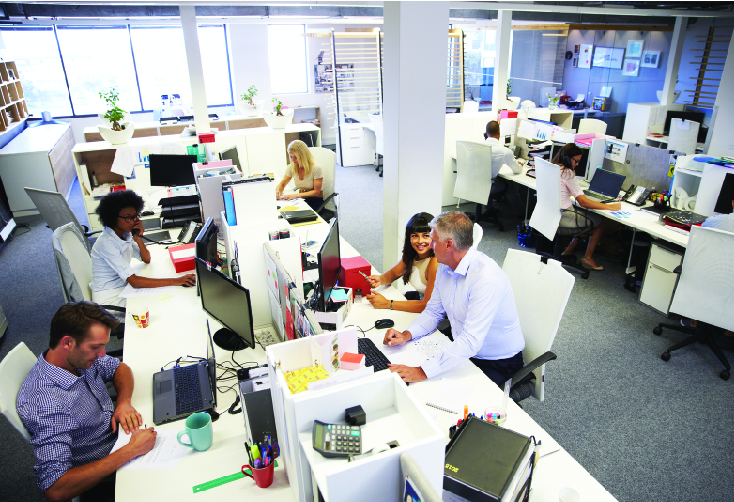The coworking market has evolved and shifted from freelancers, solopreneurs and startups to Fortune 500 companies. Major institutions are moving employees from home offices , headquarters or shuttered field offices to shared workspace environments in hopes of building engagement and productivity, as well capturing the spirit of innovation and energy often associated with startups and the work spaces where they launch their dreams.
According to Bloomberg Businessweek, Large employers are the fastest growing market for WeWork. In fact, 30% of WeWork’s 80,000 members work for companies that rent more than 10 desks.
The trend is not limited to WeWork. More than half the members of coworking spaces are employees, versus one-third in 2012 according to HOK/CoreNet Global Coworking Report.
Some spaces have long targeted corporate users, most notably Regus, whose mix of government, corporate and professional service firms makes up an estimated 80-90% of its users, according to Frank Cottle, CEO and Founder of the Alliance Network. Newer entrants targeting a corporate base include Serendipity Labs, where 45% of its members are corporate, including Heineken, PepsiCo and Microsoft.
This presents a challenge and opportunity for independent operators, according Cottle.
“One issue that will plague the smaller operators is that corporates generally want services at multiple locations under a single contract. Also, they often have specialized tech and privacy requirements that smaller operators have a hard time dealing with,” he noted.
One issue that will plague the smaller operators is that corporates generally want services at multiple locations under a single contract
Yet despite a wave of large firms adopting a coworking model, the same reasons that drive large firms to coworking spaces also apply to single-office companies, presenting opportunity for providers of all sizes.
We’ve identified 12 factors driving corporate users, large and small, to coworking spaces.
- It encourages collaboration and innovation that help grow businesses. Many coworking spaces are founded on a distinct, non-corporate premise: eliminating unnecessary physical barriers, needless rules and outdated hierarchies. Instead, they often encourage random encounters where workers from different disciplines can meet, interact and ultimately collaborate with each other.
- It provides a network of shared resources, human and otherwise. By bringing together a mix of professionals from different disciplines, coworking spaces create a community with diverse talent and synergy of services.
While solopreneurs and freelancers often seek coworking spaces for the human interaction, businesses large and small benefit from having a built-in network. WeWork claims that 70% of its members have done business together.

- Accessibility and convenience. To serve a critical mass, coworking spaces are often situated in dense and/or urban areas with access to public transportation or convenient parking. Lennar, a major homebuilder, rents space near its Chicago and Minneapolis downtown construction projects to make meetings more convenient.
Moreover, as lines blur between one’s business and personal life, convenience and accessibility become even more important. Coworking spaces often offer 24/7 accessibility to members who may have nontraditional hours. Likewise, organizations with multiple locations (or independents who unite in an amalgamated model) can offer a membership for frequent travelers that provides offices wherever they might be.
- It’s a more economical use of space. Office utilization rates are estimated at somewhere south of 60%, and even as low as 30% in some studies. Whether that is due to people working outside the office (sales, consultants, work-at-home) or merely people who are elsewhere in the building (meetings, working in company café or lounge, etc.) most companies don’t need as many desks as they did in the past.
Satellite offices typically offer less expensive alternatives, particularly when headquarters locations are in pricey and dense downtown locations. Coworking spaces provide an option that lowers the need for owned and leased space to accommodate regional and global outposts as well as remote workers.
- It provides short and long-term flexibility for occupants. Corporations have seized upon the coworking model because its agility allows them to weather economic ups and down, as well as lessen growing pains. Scaling up or down as a business expands, shrinks, merges, gets acquired or otherwise means a change in structure, one that is much easier when a company is not tied to a long-term lease, and instead, can just absorb or unload excess space without having to move out of the coworking community.
It also provides individual flexibility, accommodating changing populations and those who do not need a permanent desk, such as contractors, visiting employees, clients and employees who travel frequently.
- It offers a more engaging and energetic environment. In contrast to home-based work that can be lonely and isolating, coworking spaces can provide a high energy environment and corresponding “buzz.” Coworking communities nurture a collegial environment that creates a stimulating and engaging setting, not only from the work itself and the passion the individual may have for the for the work, but also from the stimulation members get from each other. It is a core reason why people thrive in coworking spaces, researchers found.
- It suits today’s workplace and workstyle. Coworking spaces epitomize the sharing economy. Some 30% of knowledge workers are untethered from the corporate workplace, allowing them to work in more than one place. Coworking spaces provide an additional venue for employees who work remotely. And within the space are typically a multitude of spaces in which to work, from open tables, to soft seating, cafes and enclosed quiet spaces.
- It drives engagement and improves productivity. Numerous studies show that providing choice in work environment and supporting autonomy creates a more engaged and empowered worker. Engagement drives productivity and worker satisfaction. Highly engaged workers are not just more productive, they say they are better able to focus, complete tasks in less time, are more creative and have a higher standard of work. What corporation wouldn’t want to provide such an environment?
- It enhances recruitment and retention. Coworking spaces deliver on the workplace criteria that matter most to millennials: choice, autonomy, and urban locations. Some 75% of coworking centers are located in city and mixed use communities that cater to millennials. A forward-thinking design, visually appealing setting and a plethora of amenities only add to the draw.
- It’s eco-friendly. Cutting out long-distance commutes by providing a workplace nearby conserves fuel, eliminates emissions that cause air pollution, lowers commuting stress and saves the most valuable commodity of all: time.
And, much like a city bus takes multiple cars of the road, gathering a loft-full of independent workers who formerly worked at home into one commercial space saves on lighting, heating and cooling.

- It delivers a higher level of infrastructure, amenities and services than home offices. When going to a workplace is optional – as it is for most coworking members – companies need to provide a compelling environment where people want to come to work, which means an energetic, well-appointed setting. Coworking spaces typically provide high end technology, better connectivity and collaborative technology for remote work and offer services such as receptionist, mail and package services, community manager and maintenance crew.
Well-appointed offices also provide more physical support that makes for a healthier and more productive work experience.
- It lets managers manage. While major corporations typically have a facilities management and real estate team to handle building-related issues, small-to-medium sized firms rarely have such a luxury. And troubleshooting operational headaches spreads an already stretched entrepreneur or manager thinner.
Membership in a coworking community provides a welcome relief from leasing and operational responsibilities, as one executive learned.
“I’m a manager of a company so I have a lot of things to do that don’t involve facilities managing. I don’t want to waste my time with that,” explained Brian Quan, U.S. director for an international 3D printing firm. When Quan moved his New York operations from a loft building to Bond Collective in Brooklyn, he was freed from myriad tasks and obligations and operational headaches.
“I didn’t have to worry about paying utility bills, hiring a cleaning crew, and being called out of a meeting because the plumbing was out.”
“It’s made my life so much easier,” he added, a particularly important consideration given he spends significant time in his firm’s Southern California offices.
The move also allowed him to downsize from an oversize loft to a space more in keeping with his physical requirements, which were reduced as his staff shrunk over the past year.
But it took a change of mindset to truly convince him of the value of a full-service workspace setting.
“Once I got over the mental wall that said ‘you’re paying five times as much per square foot,’ I realized that we actually gained real estate!” A wealth of uncrowded and varied common spaces gave his team plenty of options. And allowed Brian to leave those operational headaches behind.

 Dr. Gleb Tsipursky – The Office Whisperer
Dr. Gleb Tsipursky – The Office Whisperer Cat Johnson – Coworking Marketing Maven
Cat Johnson – Coworking Marketing Maven Angela Howard – Culture Expert
Angela Howard – Culture Expert Drew Jones – Design & Innovation
Drew Jones – Design & Innovation Andrea Pirrotti-Dranchak – Competitive Advantage
Andrea Pirrotti-Dranchak – Competitive Advantage Jonathan Price – CRE & Flex Expert
Jonathan Price – CRE & Flex Expert Jeremy Fennema – Tech Innovation Alchemist
Jeremy Fennema – Tech Innovation Alchemist







